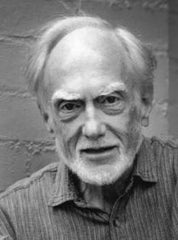Nigel Butterley
 Born in Sydney on 13th May, 1935, Nigel Butterley studied piano with Shadforth Hooper and Frank Warbrick and composition with Noel Nickson and Raymond Hanson. After a year in Europe, including study with Priaulx Rainier in London, he returned in 1963 to write Laudes, which established him as one of the foremost Australian composers of his generation. His reputation was consolidated in 1966 when his radiophonic choral work, In the Head the Fire was awarded the Italia Prize, ahead of Berio's Laborintus II.
Born in Sydney on 13th May, 1935, Nigel Butterley studied piano with Shadforth Hooper and Frank Warbrick and composition with Noel Nickson and Raymond Hanson. After a year in Europe, including study with Priaulx Rainier in London, he returned in 1963 to write Laudes, which established him as one of the foremost Australian composers of his generation. His reputation was consolidated in 1966 when his radiophonic choral work, In the Head the Fire was awarded the Italia Prize, ahead of Berio's Laborintus II.
His output includes works for solo piano, four string quartets and other chamber music, the opera Lawrence Hargrave Flying Alone, and several major orchestral works, most notably Meditations of Thomas Traherne (1968) and From Sorrowing Earth (1991). The ABC Sydney Prom Concerts in the 1960's gave him the opportunity to compose Interaction, an improvisation for painter (John Peart), piano and orchestra, and an orchestral score for First Day Covers, devised by Barry Humphries for Dame Edna Everage. Also in the sixties, he played krummhorn as a foundation member of The Renaissance Players.
From as early as Six Blake Songs (1956) poetry has been as important an influence on his work as the music and ideas of other composers, particularly Tippett, Messiaen, Cage, and more recently Gubaidulina.
In the seventies enthusiasm for the poetry of Walt Whitman resulted in three works, including Sometimes with One I Love for solo voices and small ensemble. A decade later settings of Emily Dickinson's verse comprise There came a Wind like a Bugle for vocal ensemble; poems of Du Fu were used for two small choral works.
The strongest influence since 1990 has been the English poet and scholar Kathleen Raine, noted for her writings on Blake and Yeats. The Woven Light (1994) for soprano and orchestra and Paradise Unseen (2001) written for The Song Company, are both settings of her poetry. It is also the main source for the text of Spell of Creation, for soloists, choir and orchestra, which was awarded the Paul Lowin Orchestral Prize in 2001.
As a pianist Nigel Butterley is best known for accompanying and for his many performances throughout Australia of Messiaen's Visions of the Amen and John Cage's Sonatas and Interludes for prepared piano.
After being a member of the music staff of the Australian Broadcasting Corporation for some years, Nigel Butterley became lecturer in contemporary music at Newcastle Conservatorium in 1973. Soon after the Conservatorium became part of The University of Newcastle he was appointed senior lecturer, retiring in 1991 with the assistance of a four-year Australian Creative Fellowship. The same year he became a Member of the Order of Australia and in 1996 was awarded an honorary doctorate by the University of Newcastle.
Retirement from regular teaching gave him the opportunity to present a series of ten radio programmes for Sydney's 2MBS-FM, called Music with a Future, and together with the New Zealand composer Jack Body, Music of Australia and New Zealand, for the ABC. Lecture projects for the University of Sydney's Centre for Continuing Education have included Liszt: Myth, Man and Music, and a series, The Spiritual Search in 20th-Century Music.
Nigel Butterley teaches composition at Sydney Conservatorium, works with HSC student composers, and is a tutor for the Amateur Chamber Music Society. An Ian Potter Music Commission and the Albert H Maggs Award 2004 enabled him to write two works programmed to mark his 70th birthday in 2005. The first, Never this sun, this watcher, was written for community orchestras.
Sadly, Nigel passed away February 2022.
Photograph: Bridget Elliot
See all works by Nigel in our shop
